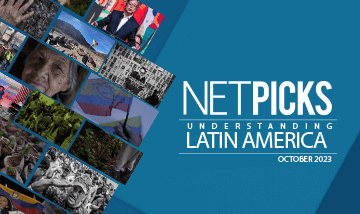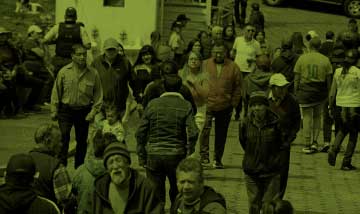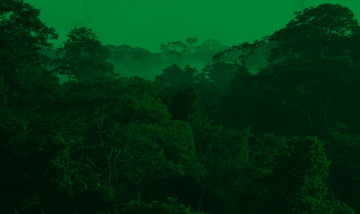Índice
- Understanding Latin America
- THREE BORDERS BETWEEN VIOLENCE AND OBLIVION
- THE IMF’S ROLE IN THE DEVASTATING IMPACTS OF COVID-19 – THE CASE OF ECUADOR
- PERU: FOR INDIGENOUS IN THE AMAZON, A DUAL THREAT: BIG OIL AND THE VIRUS
- THE UN ASKED TO SUSPEND CERREJON COAL MINING IN COLOMBIA
- DOSSIER: AUTHORITARIANISM IN THE TIME OF COVID-19: PERSPECTIVES FROM THE GLOBAL SOUTH
Understanding Latin America
This month we bring you five articles: from the hazardous trail taken by Central American women trying to reach the United States; from Ecuador, where IMF adjustment policies are increasing the country’s already desperate COVID-19 related plight; from Peru, where the recent victory of Amazon indigenous groups over a Chilean oil company has been tempered by the appearance of COVID-19; from Colombia, where indigenous Wayuu communities are asking for United Nations help in dealing with a large polluting coal mine; and finally a dossier examining authoritarianism in the era of COVID-19.
THREE BORDERS BETWEEN VIOLENCE AND OBLIVION
“If the violence of the road was the only price one had to pay to migrate to the United States, it might be easy enough to forget it all after arriving. But those who have made the journey one, two, or three times know that violence comes in cycles: it might get worse, or get better, or go away a little, but wherever it goes, there will always be a woman at the center.” So begins this beautifully written, distressing and moving history of migration by women from Central America authored by Mexican journalist Eileen Truax. Exploring the harsh reality faced by women migrants, and by describing scenes from both the migration trail and the countries the women have left behind, Truax provides a plainly human voice for the women and girls who travel but are usually silent. This is an essay about these women—the protagonists of a story that, as the author mentions, is almost always told from the perspective of men. As Truax says “there’s always something missing from the conversation. We speak of men working to make a better future for their families, yet, in El Salvador and Honduras, women are at the head of four out of every ten households.”
Eileen Truax. July 10th, 2020
https://elfaro.net/en/202007/internacionales/24631/Three-Borders-Between-Violence-and-Oblivion
.
THE IMF’S ROLE IN THE DEVASTATING IMPACTS OF COVID-19 – THE CASE OF ECUADOR
Ecuador has been one of the countries hardest hit by the COVID-19 pandemic; in June of this year the Financial Times placed the country first in the world ranking of excess mortality, with 20,000 excess deaths during the crisis. One of the major factors is the 64 per cent reduction in public investment in the health sector over the last two years; 3,680 public health workers losing their jobs in 2019 alone. However, despite the pandemic, the IMF sponsored reforms continue. While the IMF did state its support for increased public health spending as an immediate response to Covid-19, a further 11,820 public sector workers have been laid off during the crisis, and as recently as the 31st of May, the health budget suffered another cut, this time of $217 million. Despite the Ecuador’s dramatic health and financial situation, the Fund’s emergency loan, agreed in May, also contained a proposal to continue “fiscal consolidation… during the period 2019-2025.” As the author points out, a new analysis has demonstrated that, “every single low-income country that received IMF advice to cut or freeze public employment in the past three years had already been identified by the World Health Organization as facing a critical health worker shortage.”
Pablo Iturralde, July 16th, 2020
https://www.brettonwoodsproject.org/2020/07/the-imfs-role-in-the-devastating-impacts-of-covid-19-the-case-of-ecuador
.
PERU: FOR INDIGENOUS IN THE AMAZON, A DUAL THREAT: BIG OIL AND THE VIRUS
A 2017 study by Resources for the Future found that where Indigenous communities in the Peruvian Amazon have won legal title to their ancestral lands, this “reduces [forest] clearing by more than three-quarters, and forest disturbance by roughly two-thirds.” This is the context of the recent victory of indigenous rainforest communities in northern Peru over the Chilean oil giant GeoPark, which finally withdrew from Block 64 in indigenous Achuar y Wampis territory. But the victory was tempered by the presence of another threat –COVID19– which claimed the life of Santiago Manuin, chief of the neighboring Awajun people. Manuin had been a major political figure, participating in another more brutal conflict in 2009, when indigenous communities were again protesting plans to allow oil and mining companies into their territories. Now known as the 2009 Bagua massacre, the confrontation left 30 people dead, including 12 police, and 200 injured. Two years later, indigenous communities were given the right to be consulted about developments on their lands, including the ability to reject, and in 2015 the Wampis became the first to formally declare their own autonomous government. However the threats from oil companies, and the virus, have not disappeared. Petroperu will likely try to find another partner for block 64, while the virus is taking its toll on indigenous communities in the Peruvian and other Amazon regions.
Fred Pearce, July 21st, 2020
https://e360.yale.edu/features/for-indigenous-in-the-amazon-a-dual-threat-big-oil-and-the-virus?
.
THE UN ASKED TO SUSPEND CERREJON COAL MINING IN COLOMBIA
The Cerrejón coal mine, in the Guajira region of northern Colombia, is owned by three major mining companies: Anglo American, BHP and Glencore. But the neighboring indigenous Wayuu communities are not happy with the way the companies are managing the mine, and citing increased COVID-19 risks due to exposure to poor quality air and to the violation of their right to water, are calling for United Nations intervention.. Studies show that a single unit increase of PM 2.5 particulate matter increases the risk for patients with coronavirus, while COVID-19 cases have a higher mortality rate in people with pre-existing respiratory health conditions. The Colombian Constitutional Court recognized the serious health problems the Wayuu suffered even before the pandemic, and conditions have now deteriorated due a lack of clean water. According to a 2019 Constitutional Court ruling, evidence showed the effects of the mining operation on water surrounding the indigenous Reserve, but the Colombian State has not guaranteed honest and impartial information on the relationship between the mining operation and the lack of water. The communities are calling for: 1. an immediate suspension of operations of the pits and dumps that surround the community, 2. the termination of the mining operations, and 3. the gradual eradication of coal mining in Colombia.
Colectivo de Abogados José Alvear Restrepo, June 20rd, 2020
https://londonminingnetwork.org/2020/06/un-asked-to-suspend-cerrejon-coal-mining-in-colombia/
.
DOSSIER: AUTHORITARIANISM IN THE TIME OF COVID-19: PERSPECTIVES FROM THE GLOBAL SOUTH
Compiled by the Rosa Luxemburg Foundation’s International Research Group on Authoritarianism and Counter-Strategies, the dossier “Authoritarianism in the Time of COVID-19: Perspectives from the Global South” provides an overview of the situation on three continents. The principal concern is whether the pandemic state of exception is paving the way for a further undermining of democracy. If this is so, the question to be asked, is whether the process is taking place on a global scale, or whether there are real differences between regional developments. We must also examine, on the one hand, possible identifiable links between an authoritarian-populist way of dealing with the pandemic and the resulting social and economic crisis, and on the other, the specifically authoritarian dimension of the world´s responses to the pandemic. In order to provide answers in the Latin American context, the dossier examines issues such as: What does authoritarianism mean in times of coronavirus; Latin America in a Pandemic: Rights, Authoritarianism, and Conservatism; the Platform Capitalist Pandemic. An introductory inquiry into the Brazilian neoliberal management of uberization during the COVID-19 lockdown; Living (and Working) in Pandemic Times: Labor, Care Work, and Struggles in, Against, and Beyond the (Capitalist) Pandemic; Institutional Violence in the Time of Coronavirus: Argentina and its Democratic Deficit; Coronacrisis. The historical conjuncture to eradicate “development”; and, Afraid to #StayAtHome: Bolsonaro’s mobilization of fear during the pandemic.
Various Authors, International Research Group on Authoritarianism and Counter-Strategies. Rosa Luxemburg Foundation, July 22nd, 2020
https://www.irgac.org/2020/07/22/authoritarianism-in-the-time-of-covid-19-perspectives-from-the-global-south/





